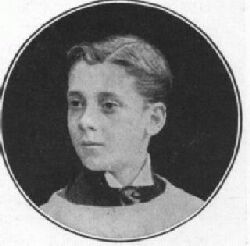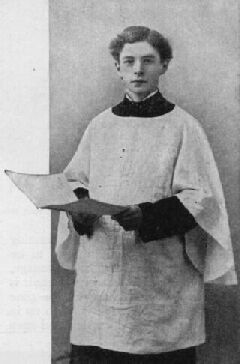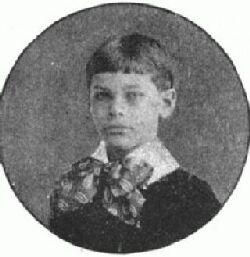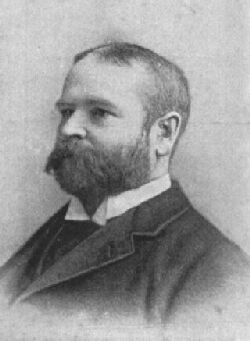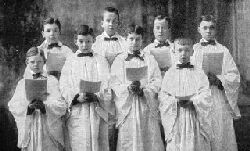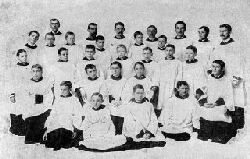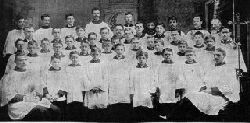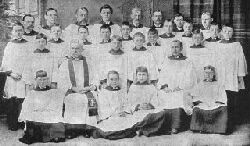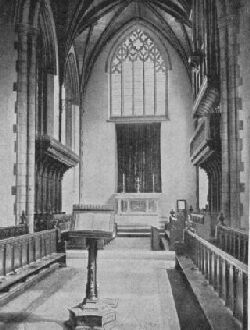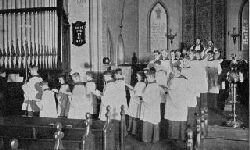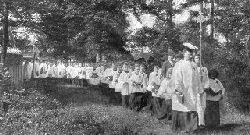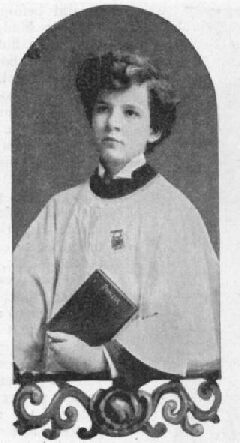|
Part IV
The Church of the Messiah was
the next in Boston to employ a vested choir.
It attained great excellence under the direction of Mr. J. T. Gardam,
who resigned a few years ago, to be followed by Mr. Joseph Stewart, the
present choir master. The
society has lately moved into a new church.
There have been some notable solo boys connected with this choir,
among them being Masters Waldo Merrill and George Proctor.
The latter, after change of voice, having a strong inclination for
music, pursued his studies at the Conservatory, and is now the organist of
the church, and gives promise of making his mark in his chosen profession.
The two choirs of St. Paul’s and Emmanuel, Boston, have both
surpliced choirs in the chancel, after having gone through the various
changes of having first quartet choirs in the gallery, then quartet and
chorus choirs, and afterwards a choir of boys and men still in the gallery
loft, finally placing this latter choir in the chancel, surpliced.
The choir of boys and men in St. Paul’s church was introduced in
September, 1887, under the direction of Mr. Warren A. Locke.
For three years it sang in the old choir loft, but in the fall of
1891 the new organ was placed in the front part of the church, and the choir
took its place beside it. The choir is sometimes augmented at special services by the
choir of Harvard College, which is also under the direction of Mr. Locke.
The choir consists of twenty-four boys and eight men.
The choir of Appleton Chapel, at Harvard, was introduced in October,
1883, being composed at that time of sixteen boys and eight men.
The numbers have since been increased to twenty-four boys and twenty
men. All the men are in the
University, and it not infrequently happens that there will be but two or
three years’ interval from the time when the soprano or alto, a Cambridge
schoolboy, leaves the choir to his re-entrance as a tenor or bass, as he
becomes a Harvard freshman. There
are daily services during term time at a quarter before nine in the morning.
At times, as at the recent service in memory of James Russell Lowell,
the choir is augmented by the choir of St. Paul’s, making a chorus of
seventy-five voices. The choir of Emmanuel Church
is under the direction of Mr. George L. Osgood, the well-known director of
the Boylston Club and the Singers’ Society of Boston, and has done
admirable work while under his charge.
It numbers forty voices, twenty-four boys and sixteen men, the latter
so chosen as to form an effective chorus for the performance also of works
for male voices. Mr. Lewis S.
Thompson is the organist and supplements Mr. Osgood in the training of the
boys. In 1889 a new organ was placed in the church, built by George
S. Hutchings, one of the most effective organs in the city.
The choir of St. James’s
Church, Cambridge, was founded in 1884.
Its growth and improvement have been rapid, and its influence is not
limited to the parish wherein its work lies.
Mr. Ernest Douglass is the organist and choir master. The choir of St. Stephen’s
Church, Lynn, [Massachusetts], was organized in the spring of 1876, under
the rectorship of the Rev. Lewis DeCormis, to whose efforts the institution
of the choir was largely due. Its
first choir master was Mr. Walter B. Bartlett, and the organist, Mr. Lemuel
G. Carpenter. In 1879 Mr.
Edward K. Weston took charge as both organist and choir master, remaining
until his death in 1891. During
his administration the choir attained its present high position among the
boy choirs of Massachusetts. Mr.
Weston was succeeded by Mr. Francis Johnson as choir master, and by Perley
B. Pilsbury as organist.
The choir of St. John’s
Church, Jamaica Plain, has done effective work under the direction of Mr. J.
Everett Pearson. Coming to the
church in 1889, he succeeded in getting a choir of boys and men together,
and after diligent practice such rapid progress was made that it was thought
that by Christmas the choir would be sufficiently advanced to make its first
essay in church on the occasion of public worship, which it did.
The choir has gone on constantly improving, and has become one of the
best choirs to be heard in the vicinity of Boston, the boys getting a
beautiful quality of tone and performing church music with accuracy and
finish. Time and space forbid me to
speak in detail of all the excellent choirs to be found in New England and
other parts of the country. There
are several fine choirs in the diocese of Connecticut that deserve special
mention, notably that of Trinity Church, Middletown, which has been under
the direction of Mr. H. DeCoven Ryder, who has not only had remarkable
success in developing the choir of his own church, but has been largely
instrumental in organizing the Choir Festival Association of the state,
which has already given three festivals with notable success.
Trinity Church, New Haven, has a boy choir under the direction of Mr.
W. R. Hedden. A former member
of Trinity choir, New York, Mr. Hedden has been able to bring to his work
the experience thus gained, and has so improved his choir as to be able to
give special evening services, bringing out such works as “The Daughter of
Darius” by Stainer; the “Advent Hymn” by Schumann; and “God, Thou
Art Great” by Spohr. A boy
choir has also within the past few years taken the place of the old quartet
at Christ Church, Hartford, so
long the scene of the labors of the late Henry Wilson, the organist, whose
music is gratefully remembered by the older members of the congregation.
Mr. George P. Havens organized the choir, and has remained in charge
up to the present time; just now, however, leaving for a similar position at
Christ Church, New Haven. At the beautiful church at
Morristown, N.J. [New Jersey], is to be heard a very efficient choir, which
has been under the direction of Mr. Alfred Baker, who is soon to relinquish
it for a metropolitan position. The
music at All Saints Church, Worcester, Massachusetts, has for many years
been rendered by a choir of boys and men.
Under the direction of Mr. Rice as choir master and Mr. G. Arthur
Smith as organist the music has advanced to a high standard of excellence.
The choir of St. Paul’s
School, Concord, N.H. [New Hampshire], has for twenty-two years been under
the charge of Mr. James T. Knox. In
1868, while the enlargement of the old chapel was in progress, the Sunday
services were held in the second story of one of the school buildings.
There the present choir master and organist began his long and
valuable services to the school. A
cabinet organ was the first instrument used, and a company of ten boys
composed the choir. Mr. Knox,
then a young man with a rare enthusiasm for music, spared no effort to
perfect himself in the divine art, and expended unlimited patience and time
in training the choir. He
imparted a portion of his own zeal to his pupils, the boys cheerfully giving
both study and play hours to practising, although no release from the
regular school work was ever gained thereby.
More than three hundred boys have belonged to the choir in the last
twenty years. In many of the boys have been developed rare solo voices;
among those who are thus numbered one recalls with pleasure Frank H. Potter,
George R. Sheldon, Augustus M. Swift, William F. Jennison, Hoffman Miller,
and George S. Hodges. A
beautiful new chapel has been occupied by the school for the past three or
four years, and a large and effective organ by Hutchings placed in the
chancel, which adds much to the attractiveness of the service.
The number of choristers is fifty-four, - twenty-eight trebles, five
altos, seven tenors, and twelve basses.
St. Paul’s Church, Concord, N.H., has maintained a boy choir for
many years, under the direction of Mr. F. H. Brown, organist and choir
master. Mr. Brown relinquishing
his post a year ago, Mr. H. G. Blaisdell succeeded him and the choir is
prospering under his administration, and promises to attain a high state of
perfection. Probably one of the most
effective choirs in the South is that of St. Paul’s Church, Baltimore
[Maryland]. This church is in
charge of the Rev. J. S. B. Hodges, a gentleman who has done so much for the
cause of church music in this country, both by his influence and writings
and especially by his compositions, the numerous anthems and canticles
emanating from his pen being used extensively by the various churches
throughout the country. The
choir dates from Easter, 1873, Dr. Hodges at first taking the whole
responsibility of the training of the choristers, oftentimes taking his
place at the organ as well at the afternoon service when the boys were
beginning to displace the old mixed choir.
Mr. Winterbottom, now of Brooklyn, was many years choir master and
organist. He was succeeded by
Mr. Crook, who afterwards went to Calvary Church, New York.
Mr. W. H. Whitingham is the present organist and choir master.
The choir consists of fourteen sopranos, five altos, five tenors and
five basses.
There are many excellent boy
choirs in New York state outside the metropolis.
At the Cathedral of All Saints, Albany, under the able direction of
Dr. Jeffries, an English organist; at Syracuse; at Rochester, where Mr. J.
E. Bagley has several choirs under his charge; at St. Paul’s, Buffalo, and
in many of the smaller cities, - the male choir has been introduced and
local choir festivals are of frequent occurrence.
It has been much easier to introduce such choirs in the West than it
has in the East, there being no old prejudices to overcome, and little or no
fear that its adoption meant or implied anything more than a more
appropriate rendering of churchly music.
At Cleveland, Detroit, Toledo, Cincinnati, and St. Louis, to say
nothing of smaller towns, may be found excellent choirs.
In Chicago, the Choir Festival held a year ago, in the Auditorium,
where some twelve hundred singers, boys and men, sang in a chorus, under the
very able direction of Mr. H. B. Roney, will give some idea of the
prevalence of this kind of choir in and about that city.
This Festival was a most decided success, from a musical point of
view, due in a large degree to the untiring zeal and energy with which Mr.
Roney entered into the preliminary work of preparing the singers for the
final rehearsals. Probably the best-known choir in Chicago is that of Grace
Church, where Mr. Roney is in charge. The
choir first sang in the church in October, 1884, under the charge of Mr.
Herbert O. Oldham; who was succeeded, in turn, by Messrs. S. B. Whiteley, C.
E. Reynolds, F. C. F. Kramer, and Mr. Roney, the present incumbent, who
assumed the charge in May, 1887, and enlarged the choir to a membership of
seventy-five choristers. The
services at Grace Church have attracted much attention since Mr. Roney has
brought the choir to its present high standard of perfection; and at the
special monthly services on Sunday evenings, the church building has been
found to be too small to accommodate the vast multitudes of people who
desired to attend. Master
Blatchford N. Kavanagh was the soloist of the choir.
This lad had a most remarkable soprano voice, which skilful training,
as well as practice, had developed so that he became one of the noted
solists of the country. Besides
having this remarkable voice, under good cultivation, the lad had, withall,
a musical nature of the highest order, and sang his selections which much
expression and feeling. Indeed,
his voice was considered so phenomenal that Mr. Roney, leaving his choir for
a time in the hands of a deputy organist, took the lad to California,
singing in all the large cities from Chicago to San Francisco.
He has never sung in the East, his voice changing some two years ago;
so that there has been no opportunity to compare him with such soloists as
Bradon, Forbush, or Noung. But
there is little doubt that this lad was one of the greatest, if not the
greatest, soloist that this country has ever produced.
There is a fine choir at St. James’s Church, under the direction of
Mr. Smedley, also at the Cathedral Church on the West side.
Mr. Walter C. Hall has charge of a choir at Emmanuel Church, and is
doing good work. The boy choir
has also taken the place of the quartet at Trinity Church. There is a very fine choir in the cathedral at Denver, in
charge of Dr. Gower, a very able organist and choir master, who came out
from England several years ago, to take charge of the music at this church. With the wonderful progress
that has been made in this country in the last fifteen or twenty years in
view, both in church music and choir training, the outlook for the future is
full of promise, and there is some warrant for thinking that the time is not
far distant when the daily service will be held in many cathedrals of the
larger dioceses at least; which, with the necessary daily practice, will
insure greater efficiency and excellence, the effect of which will be felt
at once by the parish choirs, so that, at no distant day, the standard of
church music will come up to, if not surpass, that of the mother country.
Let this be our hope. |
